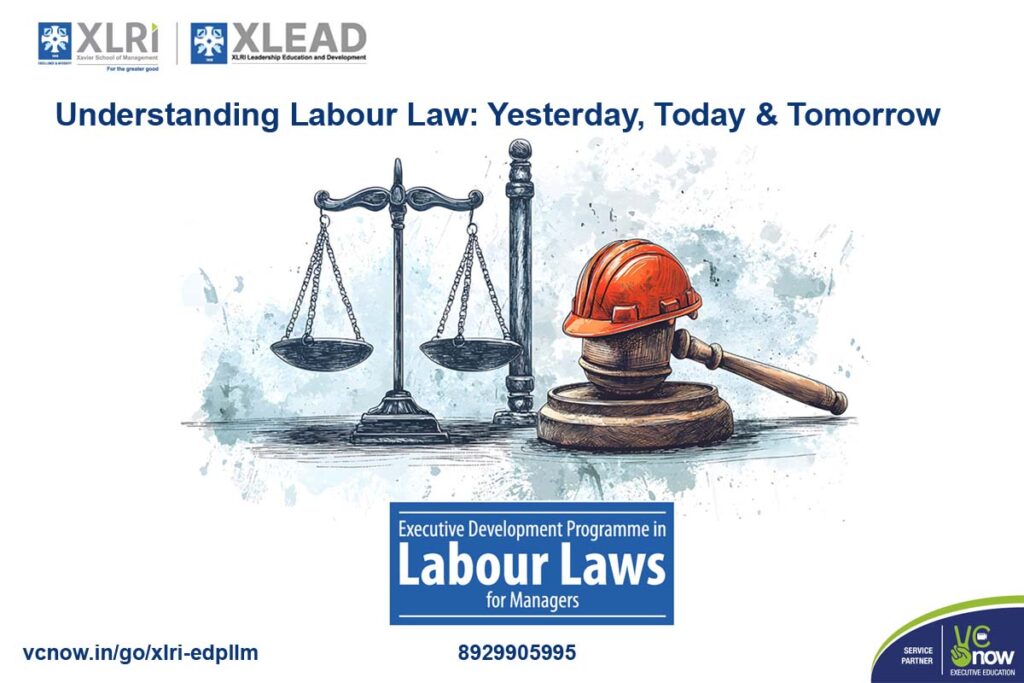
What is Labour Law?
Labour Law (also called Employment Law) is the body of rules and judicial decisions governing the relationship between employers, employees, unions, and the government.
Key Divisions of Labour Law
Individual Employment Law: Focuses on the rights of a single employee.
Covers: Minimum wage, working hours, leaves, non-discrimination, and legal procedures for termination and severance.
Collective Labour Law: Focuses on group rights and collective action.
Covers: Regulating Trade Unions, collective bargaining (negotiating wages/benefits), and mechanisms for resolving industrial disputes (strikes, lockouts) through mediation or tribunals.
Why Labour Law is Essential?
Labour law is crucial for stability because it:
- Protects Employees: Prevents exploitation and ensures safe working environments.
- Regulates the Economy: Standardizes labour practices for fair business competition.
- Ensures Social Harmony: Provides clear legal channels to resolve conflicts, preventing industrial unrest.
A firm grasp of labour regulations is no longer just an HR function; it’s a core leadership competency essential for strategic decision-making and sustainable growth in the dynamic world of work. For modern managers, understanding the evolution of labour laws—from their historical roots to tomorrow’s trends—is crucial for creating a harmonious, compliant, and productive workplace. This guide explores this evolution and highlights the executive training needed to lead with confidence.
Why Labour Law Literacy is a Non-Negotiable Managerial Skill
Every people-management decision a leader makes—from hiring and onboarding to performance management, compensation, and termination—is touched by the framework of labour law. Ignorance is not a valid legal defence and can lead to significant financial penalties, reputational damage, and a toxic work culture.
Conversely, managers who are well-versed in these regulations can protect their organization from litigation, enhance employee trust and morale, and streamline operations by implementing best practices from the outset. This knowledge forms the bedrock of what the industry calls E-A-T: Expertise, Authoritativeness, and Trustworthiness, qualities that define both exceptional leaders and top-ranking web content.
Labour Laws of Yesterday: The Foundational Pillars of Industrial Relations
To effectively implement the new rules, one must understand the spirit of the old. Why?
Because the origins of labour laws (like the Factories Act or the Industrial Disputes Act) reveal the core principles of welfare, equity, and industrial harmony that continue to underpin modern legislation.
For decades, the Indian industrial relations landscape was governed by over 40 distinct central and state laws. The primary objective of early legislation was to establish a basic floor of rights, protecting a vulnerable workforce from unsafe conditions, unliveable wages & excessively long hours.
Key Legislative Pillars of the Past:
- The Factories Act, 1948: Focused on the health, safety, welfare, and working hours of workers in manufacturing facilities.
- The Industrial Disputes Act, 1947: Provided mechanisms for the investigation and settlement of disputes between employers and employees, emphasizing collective bargaining and trade unions.
- The Minimum Wages Act, 1948: Aimed to prevent the exploitation of workers in sweated trades by setting statutory minimum wage rates.
- The Payment of Bonus Act, 1965: Mandated the payment of an annual bonus to eligible employees in certain establishments.
This era was characterized by a plethora of individual, often overlapping, statutes. The relationship was largely adversarial, framed as “workers vs. management.” For managers of the time, compliance meant navigating a complex, rigid, and sometimes contradictory set of rules. Mastery of these foundational principles is essential because they explain the “why” behind many modern corporate policies and lingering cultural attitudes.
Labour Laws of Today: Navigating the Modern Compliance Labyrinth
The 21st-century workplace is a different world. Globalization, the rise of the service sector, and new organizational structures have rendered the old, fragmented system inadequate. In response, the Indian government embarked on a historic consolidation, weaving 29 central labour laws into four comprehensive, streamlined codes.
The Four Pillars of Modern Indian Labour Law:
- The Code on Wages, 2019: This code universalizes the concept of minimum wage and timely payment of wages across all sectors. It simplifies definitions and aims to ensure “equal pay for equal work,” reducing litigation and bringing uniformity.
- The Code on Social Security, 2020: Perhaps the most transformative, this code seeks to extend social security benefits to all workers, including those in the unorganized sector and the gig economy. It streamlines provisions for Provident Fund (EPF), Employees’ State Insurance (ESI), gratuity, and maternity benefits.
- The Industrial Relations Code, 2020: This code simplifies conditions for hiring and layoffs, introduces stronger conditions for legal strikes, and sets provisions for the negotiation of “fixed-term employment.” It aims to balance worker protection with the operational flexibility required by modern businesses.
- The Occupational Safety, Health and Working Conditions Code, 2020: This code consolidates laws related to worker safety, health, and working conditions, applying to both establishments and workers, with a focus on creating a safe and healthy work environment.
This seismic shift demands a proactive, strategic approach from managers. Relying on legacy knowledge is a significant business risk. The modern manager must be a confident interpreter of these codes, capable of implementing them in day-to-day operations, from drafting employment contracts to managing remote teams. This complex reality is precisely why specialized, contemporary education is no longer a luxury but a necessity.
Bridging the Knowledge Gap: The Role of Specialized Education
How does a busy manager stay ahead of these changes? The most effective way is through targeted executive education. Enrolling in a high-calibre programme, such as the XLRI Executive Development Programme in Labour Laws for Managers, provides a structured, authoritative pathway to mastery. This programme stands out among Online Law courses because it is not a theoretical law degree; it is a practical, application-oriented course designed specifically for the challenges faced by corporate managers and leaders.
Labour Laws of Tomorrow: The Future of Work and Labour Law
The evolution of work shows no signs of slowing down. The landscape of “tomorrow” is being shaped by powerful forces that will, in turn, dictate the next generation of labour regulations. The managers who will thrive are those who anticipate these changes today.
Key Trends Shaping the Future:
- The Gig and Platform Economy: The rapid growth of freelance, contract, and platform-based work (e.g., ride-sharing, food delivery) challenges the traditional employer-employee relationship. Future laws will need to define the status of these workers, ensuring they have access to minimum wage guarantees, social security, and protection from arbitrary “de-platforming.”
- Remote and Hybrid Work Models: The widespread adoption of remote work raises complex questions about jurisdiction, work-hour tracking, overtime compensation, and workplace safety in a home office. Legislation will need to adapt to this borderless workplace.
- Artificial Intelligence and Algorithmic Management: As AI is used for hiring, performance monitoring, and even termination decisions, new regulations will be required to prevent bias, ensure transparency, and protect employee privacy and dignity.
- Mental Health and Well-being: The future of labour law will increasingly recognize psychosocial risks. Employers will have a greater duty of care to prevent workplace stress, harassment, and burnout, making mental well-being a formal component of occupational health and safety.
In this future, labour law knowledge will be less about reactive compliance and more about proactive, strategic framework design. It will be the tool used to build resilient, ethical, and attractive organizations that can secure top talent in a competitive market.
The XLRI Advantage: Why XLRI’s Labour Laws Course is the Smart Choice
Targeted Expertise: This is a specialized online law course custom-designed for managers and HR practitioners, not just lawyers. The curriculum focuses on operational relevance, making the knowledge immediately actionable in your daily role.
Curriculum Alignment: The programme’s structure is built around the “Today and Tomorrow” challenges, comprehensively covering the new Labour Codes, strategic HR, corporate governance, and complex industrial relations.
Learning Format: The convenience and effectiveness of the online labour law courses structure—featuring live, interactive sessions directly to your desktop—ensures minimal disruption to your professional life while maximizing learning retention.
XLRI Credibility: You gain your qualification from XLRI Jamshedpur, an institute synonymous with excellence and ethical leadership in Human Resources and Management education. This credential holds immediate industry recognition and value.
The XLRI Labour Law Course helps executives acquire the skills needed to:
- Confidently interpret and implement the four new labour codes.
- Develop robust HR policies that are both compliant and conducive to a positive work culture.
- Effectively handle disciplinary proceedings, disputes, and negotiations, minimizing legal risk.
- Strategically manage the workforce of the future, including gig and remote workers.
- Enhance their professional profile with a certification from one of India’s most prestigious management institutes.
By transforming legal complexity into a strategic advantage, this programme empowers you to lead with authority. Explore the XLRI Executive Development Programme in Labour Laws for Managers to invest in your most valuable asset: your knowledge.
Conclusion: From Compliance to Competitive Advantage
From the foundational pillars of yesterday to the uncharted frontiers of tomorrow, labour law knowledge has cemented its place as a non-negotiable asset for every leader. It is the thread that connects ethical people management with robust business performance. Prioritizing your professional development through a credible and practical XLRI Labour Law Course is the most effective strategy to future-proof your career, ensure organizational compliance, and build the trustworthy leadership required to succeed in the future of work.
Frequently Asked Questions on Labour Law

What is the best online course for labour laws in India for managers?
The XLRI Executive Development Programme in Labour Laws for Managers is highly regarded. It is specifically designed for working professionals and managers, offering a comprehensive curriculum that covers historical contexts, the new labour codes, and practical application.

How are the new labour codes different from the old laws?
The new labour codes (2020) consolidate 29 central laws into 4 simplified codes: Wages, Industrial Relations, Social Security, and Occupational Safety & Health. The key difference is a shift from rigid, compliance-heavy statutes to more flexible, consolidated codes that aim to ease business while extending social security benefits.

Why should a non-HR manager learn about labour laws?
Every manager who leads a team is responsible for ensuring fair practices, handling disputes, and maintaining a legally compliant work environment. Knowledge of labour laws helps in effective decision-making, risk mitigation, and building trust with employees, which are core managerial functions.

Can I do a labour law course online while working?
Yes, many top-tier institutions offer executive-friendly Online Law courses. The XLRI Labour Law Course mentioned is conducted in a live online format, specifically designed for working managers to learn without career disruption.

What are the key topics covered in an executive labour law programme?
A comprehensive programme typically covers the evolution of labour laws, the four new labour codes, wage and bonus administration, managing disciplinary proceedings, social security, industrial disputes, and the future of work regulations.

How will labour laws impact the future of work and gig economy?
Future labour laws are expected to focus on defining the employment status of gig workers, ensuring minimum wage security, providing social safety nets, and regulating algorithmic management and data privacy in a remote or platform-based work environment.

Is an XLRI certification in labour laws worth it for a corporate professional?
Absolutely. An XLRI Labour Law Course certification adds significant credibility and demonstrates expertise in a critical, high-stakes area. It enhances your E.A.T. (Expertise, Authoritativeness, Trustworthiness) and can be a career differentiator for roles in management, operations, and HR.

What is the duration and format of the XLRI programme in labour laws?
The programme is an executive development course typically spanning 3-6 months, delivered through live online sessions. This format allows for real-time interaction with faculty and peers, making it ideal for busy professionals.

How does knowledge of labour laws help in preventing corporate litigation?
A thorough understanding allows managers to implement policies correctly, handle employee terminations and disciplinary actions legally, and maintain proper documentation. This proactive compliance significantly reduces the risk of costly legal disputes, penalties, and reputational damage.

Are there any prerequisites for enrolling in an advanced employment law course?
Most executive-focused employment law courses like the one from XLRI are designed for working professionals. Typically, a bachelor’s degree and some years of managerial or team-handling experience are the primary prerequisites, as the curriculum builds on real-world workplace challenges.








